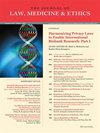骗子综合症:定性研究中的欺诈性参与者会扭曲结果。
IF 1.7
4区 哲学
Q2 ETHICS
引用次数: 0
摘要
我们报告了冒名顶替的研究参与者的经历,这些人不如实陈述自己,并确定了调查人员可以用来筛选此类参与者的特征。我们比较了冒名顶替者和有效参与者的反应,表明冒名顶替者有意义地改变了定性研究结果,对政策干预或研究通知的后续研究产生了影响。重要的是,调查人员要警惕潜在的冒名顶替参与者,并相应地计划他们的研究。本文章由计算机程序翻译,如有差异,请以英文原文为准。
Impostor Syndrome: Fraudulent Participants in Qualitative Research Can Skew Results.
We report on an experience with impostor research participants, people who misrepresent themselves, and identify characteristics that can be used by investigators to screen out such participants. We compare the responses of impostor and valid participants, showing that impostors meaningfully change qualitative study findings with implications for policy interventions or follow-on research informed by the study. It is important for investigators to be alert to the potential for impostor participants and plan their research accordingly.
求助全文
通过发布文献求助,成功后即可免费获取论文全文。
去求助
来源期刊

Journal of Law Medicine & Ethics
医学-医学:法
CiteScore
2.90
自引率
4.80%
发文量
70
审稿时长
6-12 weeks
期刊介绍:
Material published in The Journal of Law, Medicine & Ethics (JLME) contributes to the educational mission of The American Society of Law, Medicine & Ethics, covering public health, health disparities, patient safety and quality of care, and biomedical science and research. It provides articles on such timely topics as health care quality and access, managed care, pain relief, genetics, child/maternal health, reproductive health, informed consent, assisted dying, ethics committees, HIV/AIDS, and public health. Symposium issues review significant policy developments, health law court decisions, and books.
 求助内容:
求助内容: 应助结果提醒方式:
应助结果提醒方式:


